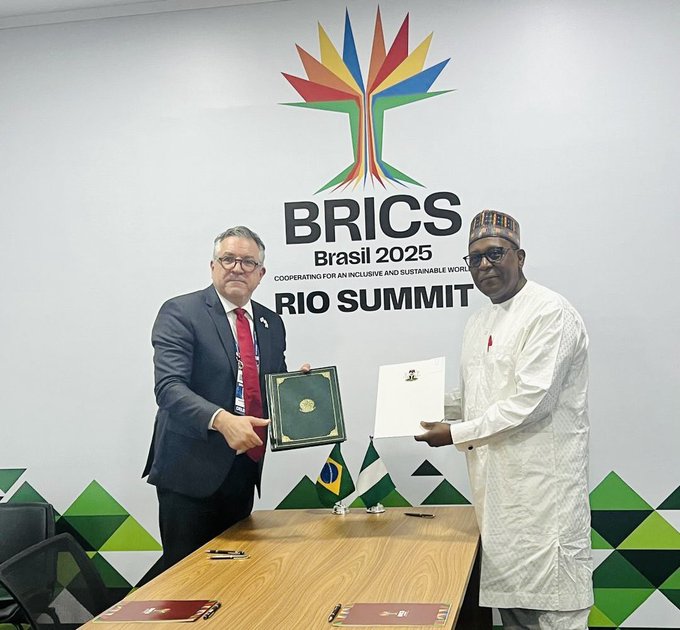Nigeria has signed a milestone Memorandum of Understanding (MoU) with Brazil to strengthen health collaboration, improve vaccine access and production, and boost local manufacturing of essential medicines and pharmaceutical raw materials.
The agreement was signed on the sidelines of the BRICS Health Ministers’ meeting in Brazil by Nigeria’s Minister of Health and Social Welfare, Muhammad Pate, and his Brazilian counterpart, Alexandre Padilha.
Mr Pate, a doctor, in a post on his X account, explained that the agreement fully aligns with the Nigerian Health Sector Renewal Investment Initiative (NHSRII) and supports the Presidential Initiative on Unlocking the Healthcare Value Chain (PVAC), a flagship under the NHSRII that aims to expand domestic production, crowd in private investment, and create high quality jobs across the health sector.
He said, “This milestone agreement reflects the strategic vision and international cooperation priorities of President Bola Tinubu, under whose leadership Nigeria is implementing bold and far-reaching reforms to strengthen its health system, advance local manufacturing, and reposition the country as a regional hub for pharmaceutical innovation and self-reliance.”
The minister had disclosed that the federal government, through PVAC, aims to increase local manufacturing of pharmaceuticals and medical devices to 70 per cent by 2030; adding that part of the initiative’s broader strategy includes significantly expanding the workforce in life sciences manufacturing, with the number of full-time employees expected to grow by tens of thousands from the current figure of about 20,000.
Vaccine access and pharmaceutical raw materials
Mr Pate explained that the MoU establishes a structured framework for cooperation in critical areas, including vaccine access and production.
The partnership, according to him, will begin with exploring possible government-to-government (G2G) procurement options and progressively move towards local manufacturing of vaccines, essential medicines, and pharmaceutical raw materials in Nigeria.
“It further provides avenues for technical cooperation, knowledge exchange, and skills development, all of which are essential to building a resilient, inclusive, and future-ready health system for our people both in Nigeria and across Africa,” he added.
Strengthening South–South cooperation
“This partnership strengthens the bonds of South–South cooperation and affirms the shared commitment of Nigeria and Brazil to building sustainable, high-performing health systems that deliver value, equity, and biosecurity for their people,” Mr Pate said.
He added that under President Tinubu’s leadership, Nigeria is laying a generational foundation for a stronger, more inclusive, and investment-ready, people focused health system anchored on equity, quality outcomes, resilience, and impact.


